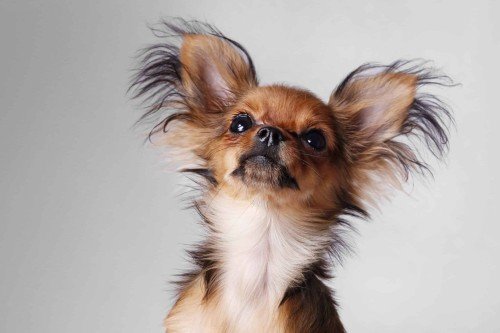
The Russian Toy, also known as the Russian Toy Terrier or Russian Toy Spaniel, is a small breed of dog that originated in Russia. Despite its small size, this breed is known for its lively and playful personality, making it a popular choice for families with children or for those living in smaller spaces like apartments.
The Russian Toy comes in two varieties: the smooth-haired and the long-haired. The smooth-haired variety has short, shiny fur, while the long-haired variety has longer, silky hair. Both varieties come in a range of colors, including black, brown, tan, and white.
Historically, the Russian Toy was popular among the Russian aristocracy as a lap dog, but its popularity dwindled during the Soviet era. However, breeders worked hard to revive the breed and in 2006, the Russian Toy was recognized by the American Kennel Club.
In terms of temperament, the Russian Toy is known to be a lively and affectionate dog that loves to play. They are also intelligent and respond well to training, making them an excellent choice for first-time dog owners. Due to their small size, they are not suited for rough play and can be easily injured if mishandled. However, they are well-suited for apartment living as they do not require much space to exercise and can be trained to use a litter box.
Like all dogs, the Russian Toy requires regular exercise and mental stimulation. Daily walks and playtime are essential to keep them healthy and happy. They also require regular grooming to keep their coat healthy and shiny.
In terms of health, the Russian Toy is generally a healthy breed with a lifespan of around 10-12 years. However, like all breeds, they can be prone to certain health issues such as dental problems, luxating patellas, and heart murmurs. It is important to buy from a reputable breeder who screens their dogs for these health issues.
One of the most common health issues in the Russian Toy is dental problems. Due to their small size, their teeth can become crowded and can be more prone to tartar buildup and gum disease. It is important to brush their teeth regularly and provide them with appropriate chew toys to help keep their teeth healthy.
Another health issue that the Russian Toy can be prone to is luxating patellas, a condition in which the kneecap becomes dislocated from its normal position. This can cause pain and limping and may require surgery to correct. It is important to buy from a reputable breeder who screens their dogs for this condition.
Heart murmurs are another health issue that the Russian Toy can be prone to. A heart murmur is an abnormal sound heard when listening to the heart with a stethoscope. While many dogs with heart murmurs live long and healthy lives, some can develop heart disease that requires treatment.
It is important to note that not all Russian Toys will develop these health issues. However, it is important to be aware of these potential health issues and to buy from a reputable breeder who screens their dogs for these conditions.
Regular veterinary check-ups are essential for maintaining the health of your Russian Toy. Early detection and treatment of health issues can help prevent them from becoming more serious and can extend the lifespan of your dog.
In addition to regular veterinary check-ups, providing your Russian Toy with a healthy diet and regular exercise can also help maintain their overall health. A well-balanced diet that is appropriate for their age and activity level can help keep them at a healthy weight and reduce the risk of developing health issues.
While the Russian Toy is generally a healthy breed, it is important to be aware of potential health issues and to take steps to maintain their overall health. Regular veterinary check-ups, a healthy diet, and regular exercise can help ensure that your Russian Toy lives a long and healthy life.
In conclusion, the Russian Toy is a delightful breed that makes an excellent companion for families with children or those living in smaller spaces. They are lively, playful, and affectionate, making them a joy to be around. If you are considering getting a dog, the Russian Toy is definitely a breed worth considering.








